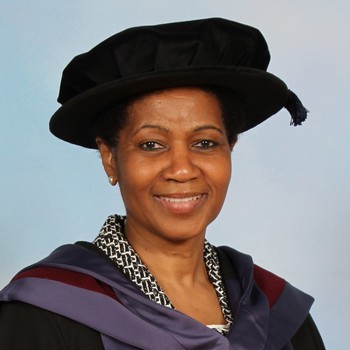DOCTOR OF PHILOSOPHY (HONORIS CAUSA)
 Phumzile Mlambo-Ngcuka was born in Clermont, Durban, in 1955. She obtained a bachelor's degree in social science and education from the National University of Lesotho in 1980 and later a master's degree in philosophy from the University of Cape Town in 2003, which dealt with educational planning and policy.
Phumzile Mlambo-Ngcuka was born in Clermont, Durban, in 1955. She obtained a bachelor's degree in social science and education from the National University of Lesotho in 1980 and later a master's degree in philosophy from the University of Cape Town in 2003, which dealt with educational planning and policy.
Starting her career as a teacher in the Natal Province in 1980, she fought actively against the apartheid system, ensuring that the form and content of the struggle for democracy took into consideration race, class and gender.
Her work in the international arena began in earnest in 1984 in Geneva at the World YWCA (Young Women's Christian Association). Here she established a global young women's programme during the 1985 UN International Youth Year, in all the regions of the world where YWCA formations existed. The focus was on education, health, the environment, peace and economic self-reliance.
Returning to South Africa, she pursued her passion for education and people-driven community development, first as Director of the Ecumenical Action Movement Team in Cape Town and later establishing the country office of World University Services (WUS), an international education NGO providing funding for students denied opportunities on the basis of race.
With the heralding of South Africa's inaugural democratic government in 1994, Dr Mlambo-Ngcuka's talent and leadership saw her election as a Member of Parliament. She chaired the Portfolio Committee on Public Services and Administration, responsible for overseeing the creation of a unified, professional, non-racial and non-sexist public service that would serve the needs of all communities.
Recognising her tenacity and willingness to charter unknown territory, she served as Deputy Minister in the Department of Trade and Industry (1996 - 1999), and later as Minister of Minerals and Energy (1999-2005). In both these portfolios she spearheaded unprecedented initiatives to enable black and women's economic empowerment and entrepreneurship, creating opportunities for economic inclusion through platforms such as SAWIMA (South African Women in Mining Association) and WOESA (Women in Oil and Energy South Africa). Her leadership also saw the development of a number of significant policies, including women's participation in mining; making mining rights available to a much broader segment of the population, specifically previously disadvantaged people.
Her pioneering work continued when she was elected as South Africa's first female Deputy President. Whilst serving in this capacity between 2005 and 2008, Dr Mlambo-Ngcuka held responsibility, amongst others, to lead skills development and a national anti-poverty campaign. In both these focus areas, she pioneered initiatives aimed at bringing the advantages of a growing economy to the poor, whilst paying particular attention to the skilling of women to participate at the commanding heights of the economy.
In 2013 she was awarded a doctorate from the University of Warwick (EngD) for her work on using mobile technologies to support Teacher Development in resourcing poor nations. Phumzile Mlambo-Ngcuka's swearing into office on 13 August 2013 as the United Nations Under-Secretary-General, Executive Director of UN Women is the culmination of a life-journey that has ceaselessly carved out opportunities for women's leadership development and socio-economic participation.
For her contribution to society through her pioneering work to create opportunities for women to participate in the economy, in traditionally male-dominated sectors such as mining and energy, and the resultant impact on improving the lives of poor people and developing the community, it is an honour for Nelson Mandela Metropolitan University to confer the degree of Doctor of Philosophy (honoris causa) on Phumzile Mlambo-Ngcuka.